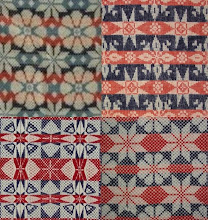


Without spun fibers, the handweaver of linens and coverlets could not have done his or her work. Even after spinning mules and jennies made quick work of transforming cotton and some wools into commercially available yarns, many handweavers still used the fibers gathered and spun by members of their communities. Quite a few weavers' advertisements and accounts books note how many cuts or skeins were required if customers provided some of the yarns for their coverlets.
The handspinners of flax used spinning wheels such as the one pictured on this page. A correspondent writes:
"I just bought this wheel in an antique shop in the Upper Peninsula of Michigan. It was in great shape and I looked at it quick and said I'd buy it thinking that it was an antique repro. . . . I cleaned it up and found the name stamped on the table; BY D. SCHOONOVER
"I am trying to find more info about this wheel. I bought it to spin on and didn't want to use it if it had a really neat history. I know this is a flax wheel and there was even some fiber spun on the bobbin that I cut off. The center of the bobbin was painted gold. I am going to have a few new bobbins made a little larger so I can spin wool at a reasonable speed! I love antiques and own many, I had to make a couple repairs but did so in a loving way! A friend looked it over and told me I'd have to pull the hooks out of the flier and . . . put in new cup holder hooks, ugh, I almost died!"
* . * . * . *
For more information, or if you have information on a D. Schoonover who could have made this, (he could have been a turner or joiner), contact M. Habegger, smashabs at centurytel.net.
Photographs copyright (c) 2009 M. Habegger
* . * . * . *
The National Museum of the American Coverlet in Bedford, Pennsylvania, opened a year-long free exhibition of textile processing implements in September, 2009. For more information see
http://www.coverletmuseum.org/museum.htm (click first on "Calendar").
Another collection of textile tools, including spinning wheels, is the Home Textile Museum, in Orwell, Bradford County, Pennsylvania. You can visit on the internet at:
http://www.hometextiletoolmuseum.org/.
The Newark Valley Historical Society, Tioga County, NY, has some interesting notes on some types of looms and spinning wheels, here:
http://www.nvhistory.org/loomswheels.shtml

No comments:
Post a Comment